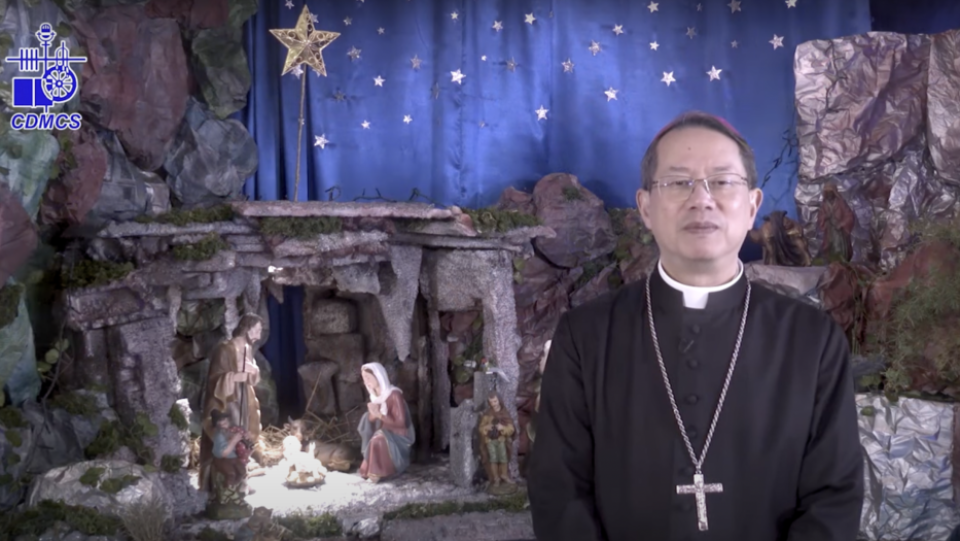
2022年李斌生主教聖誕節文告
實踐「愛近人」的真理
各位親愛的兄弟姊妹:
這場新冠肺炎疫症自開始以來已有三年的時間,教區與澳門社會都共同跨越了許多困難的時刻。最近,許多的封控和隔離措施到現在已經逐漸完結,市面瀰漫着因着通關和經濟復甦而帶來的希望和喜樂。然而,社會開始廣泛感染新冠病毒,同時亦增添了一份不安和緊張的憂慮。
藉着聖誕的來臨,讓我們細想一下馬槽中降生的,那位靜靜躺着的小耶穌,由祂在聖母瑪利亞胎中成孕,到祂出生的期間,亦同時伴隨着喜樂和憂傷的:聖言降生成人,取了肉軀的喜樂,但是瑪利亞未與若瑟成婚就懷孕了,帶來了世俗眼光上的擔憂;懷胎帶來生命的喜樂,卻要面對長途跋涉到白冷城登記和無住宿的憂傷;嬰孩誕生的喜樂隨即遇到逃亡埃及的苦難等等。
現階段我們可到外地旅行和探親,但若當我們的鄰人生病時,又或者當我們自己都染病時,此時我們將要面對社會和人際關係的新挑戰。關於這一點,答案可在教宗方濟各在 《眾位弟兄》的通諭中描述了路加福音所載的「慈善的撒瑪黎雅人」(路10:25-37)中找到靈感。這是一個非常著名的福音故事,它不僅教導我們關於愛德的意義,也教導我們該如何善待別人。
一般來說,我們反思這個故事時,其中一個會想到的問題,就是「誰是我的近人?」這樣想的話免不了會陷入相對主義的陷阱,彷彿在區分你我,在區別「誰不是我的近人」。教宗卻邀請我們這樣深思:「你認為自己是故事中的哪一位人物?」。我們時常受到誘惑想無視他人,我們已習慣除非事情直接影響我們,否則便視而不見,冷漠地從旁邊走過去,甚至別人受苦的景象則會使我們感到困擾和不安,因為我們不想為人家的問題浪費時間。這樣的社會是建立在無視人民的痛苦之上。(《眾位弟兄》通諭,64-65)
以前,我們在澳門常常以第三者的角度觀看着世界各地或鄰近地區疫情的擴展。現在我們要親身體會到「開放」和「感染」的矛盾感受,要開始面對「愛近人」這真理的實踐。「我熱切期盼在這個時代,我們能夠認清每一個人的尊嚴,從而在普世重新喚起對兄弟情誼的渴望。」(同上,8)
聖多瑪斯.亞奎那嘗試闡明天主以其聖寵成就的愛是怎樣的經驗。他說愛是一種專注於別人的活動,「愛者視被愛者好像是與自己一體的。」這一切源於尊重和欣賞,此為「仁愛」一詞的最終意義:被愛者對我來說是「珍貴的」,也就是認為對方「極有價值」。(同上,93)
故此,未來數月內,我們對漸漸廣泛感染的情景要積極推行互愛互助精神,一同互守秩序、潔淨的生活習慣,支持政府對防疫等各方面的指引,遇到染病的親友也需要多加精神和物質上的支援。
讓我們每天都勇敢地面對這一個抉擇:要成為慈善的撒瑪黎雅人(同上,69)。誠如教宗的總結:「『不論他人遠在天邊,還是近在眼前,也同樣愛他們』的人,是有福的。這種兄弟情誼使我們得以肯定、欣賞和愛每一個人,超越物理的距離和地域的局限,也不論對方的出身或背景。」(同上,1)
最後,讓我們在馬槽前默想福音中小耶穌和旁邊的瑪利亞、若瑟、天使、牧羊人們的愛,那就是聖誕節的喜訊。在這聖誕節和新的一年裡,藉着我們主耶穌基督誕生的愛和希望,期望澳門教區與澳門社會一起,以及鄰近地區和世界各地都能回復經濟繁榮,民生生活得到穩定和幸福。
祝各位聖誕快樂,新年進步。
+李斌生主教
天主教澳門教區
2022 Christmas Message
of H.E. Most Reverend Stephen Lee
Practice the Truth of “Loving Your Neighbor”
Dear brothers and sisters in Christ,
It has been three years since the beginning of COVID-19, and the Diocese and Macau’s society have worked together through many difficult moments. Recently, many of the quarantine measures have been coming to an end, and there is a sense of hope and joy in the city as a result of reopening and economic recovery. However, the beginning of a widespread infection with the new coronavirus has added a sense of anxiety and nervousness to society.
In this Advent season, let us meditate on the baby Jesus who was born in the manger, that baby Jesus who is lying still and quiet. From the moment he was conceived in the womb of the Virgin Mary, until the moment he was born, it was a time of both joy and uncertainty: the Word of God becoming man and taking on flesh was a joy, but Mary conceiving without Joseph caused so much anxiety; Mary’s pregnancy brought the joy of life, but faced at once the challenge of traveling a long way to Bethlehem to register, eventually having nowhere to stay; the joy of the birth of a baby followed by the suffering of fleeing to Egypt, etc.
Right now we can travel and visit our relatives, but when our neighbors get sick, or when we all get sick, we will face new challenges in society and interpersonal relationships. The answer to this can be found in Pope Francis’ encyclical Fratelli Tutti as he describes Luke’s “Good Samaritan” (Lk 10:25-37). This is a well-known parable from the Gospel, which not only teaches us about the meaning of charity, but also how we can be kind to our neighbor.
Generally speaking, when we reflect on this parable, one of the questions that comes to mind is, “Who is my neighbor?” If we think like this, we inevitably fall into the trap of relativism, as if we make a distinction between others and I, and “who is not my neighbor.” The Pope invites us to reflect, “Which character in the parable do I identify with?” We are often tempted to ignore others. We are used to closing our eyes to things and passing by with indifference, unless they affect us directly, sometimes to the extent that the images of other people’s suffering disturb us since we don’t want to waste time on their problems. Such a society is built on disregard for people’s suffering. (cf. Fratelli Tutti, 64-65)
In the past, we, in Macau, have “watched” the epidemic spread around the world and into neighboring regions from a third-party perspective. Now, we personally experience the contradictory feelings of “opening up” and “contamination,” and begin to experience the need for the practice of “love of neighbor.” “It is my sincere wish that in this age, we recognize the dignity of every human being, and can universally awaken the desire for brotherhood” (ibid., 8).
St. Thomas Aquinas explains how we can experience the love that God accomplishes by His grace. For him love is an action directed toward the other, “the lover sees the beloved as one with himself,” considering him “precious,” esteemed, and “extremely valuable.” (ibid., 93)
Therefore, in the coming months, we should actively promote the spirit of love, assistance and mutual respect in the gradually spreading situation of infection; maintain orderly and hygienic habits; and together support the government’s guidelines on epidemic prevention, while calling on family members and friends who are faced with the disease to pay more attention to the moral and material support their relatives need.
Let us courageously face this one choice every day: to be good Samaritans (ibid., 69). As the Pope concluded: Blessed is the man who loves, “his brother, both when he is far away and when he is near you.” (ibid., 1)
“Blessed are those who love others equally whether they are far away or in front of them. This brotherhood allows us to affirm, appreciate and love each other, regardless of physical distance and geographical boundaries, regardless of each other’s origin or background.”
Finally, let us meditate upon the Gospel, on the manger, on the love of Jesus, and of Mary, Joseph, the angels and the shepherds beside him, that is the joy of Christmas. In this Christmas and New Year, through the love and hope that the birth of our Lord Jesus Christ brings, we hope that the Diocese of Macau, together with Macau society, as well as our neighbors and the rest of the world, will recover economic prosperity, stability and happiness in people’s lives.
I wish you all a Merry Christmas and a Happy New Year.
+ Most Rev Stephen Lee Bun Sang
Bishop – The Catholic Diocese of Macau
來源:天主教澳門教區
